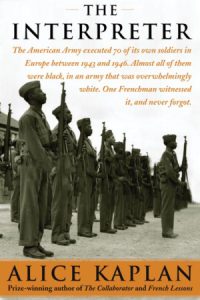Roger Grenier Introduction
Paris, October 6, 2005
The Village Voice Bookshop/ La Librairie Village Voice

First of all, I should say that I knew her while she was doing research for her book about the trial of Robert Brasillach. She wanted to meet me because, as a journalist after the Liberation, I attended many trials of collaborators. Unfortunately, not Robert Brasillach’s trial. But Alice Kaplan and I became good friends and I am very grateful to her, because she translated three of my books into English.
And now, I must confess to you publicly that I have some responsibility for the existence of The Interpreter.
I had a friend, the great French writer Louis Guilloux, who was himself a close friend of André Gide, André Malraux, and Albert Camus. Guilloux, who was a Breton, spent the war in Saint-Brieuc. And there, at the time of the liberation of Britanny, he was hired by the American Army 8th Corps Judge Advocate Division, located in Morlaix, as an interpreter in their court-martial. His job was to translate into English the testimony of French witnesses during the investigations and the trials. Louis Guilloux followed this American court-martial from Morlaix to Saint-Quentin. He saw GIs judged for crimes – including rapes and murder – against French citizens.
Imagine that little man, with a typical Breton face, his left hand always clenching his pipe, and wearing, for the occasion, the uniform of an American officer.
That experience of his ended with a book, of course. A book entitled O.K. Joe — a novel, but a novel where he changed very little. That’s where my responsibility begins. I gave O.K. Joe to Alice. She was so interested in it that she translated that little book for The University of Chicago Press. But this was not enough for her. She embarked upon a vast investigation of U.S. Army Courts-Martial during the Second World War. I suppose she will tell you, in a moment, how that research took her to the U.S. army archives in College Park, Marlyand, to the families of condemned G.I.s in the Deep South, to the villages of Brittany. She even found the secret cemetery, near Soissons, where the American Army buried the soldiers it sentenced to death and hanged. Perhaps she will tell you that the most difficult challenge of all was getting permission to take a look at Guilloux’s manuscripts in the municipal library of Saint-Brieuc.
In the end, Alice Kaplan wrote a book where each fact is true, but where the tone is not that of a standard history. The Interpreter, which begins with the execution of a black soldier at Plumaudan, in the Côtes du Nord, is a narrative with a writing style that belongs to literature. With her, we follow the American court martial as it moves across France. And always, in a corner of the picture, is that puny little man, Louis Guilloux, the moral conscience of the story.


